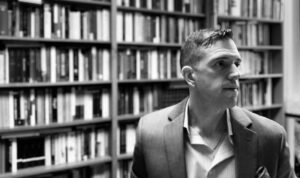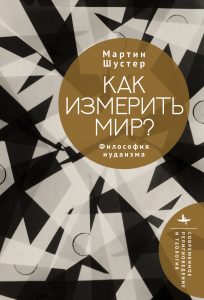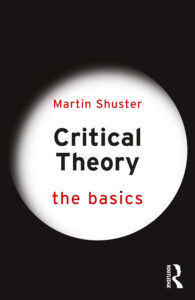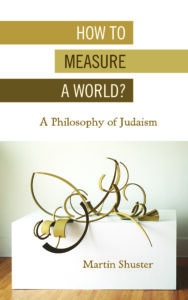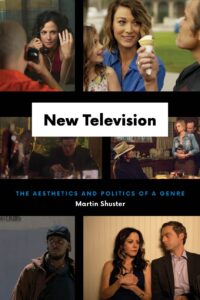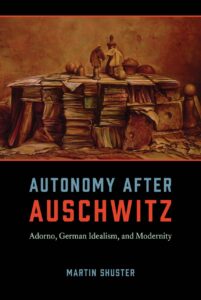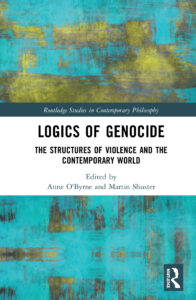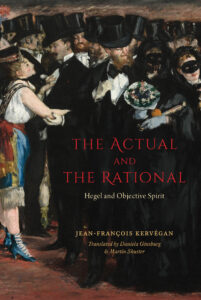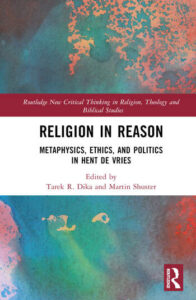Martin Shuster is Professor of Philosophy and the Isaac Swift Distinguished Professor of Jewish Studies at the University of North Carolina at Charlotte. He is also affiliated with the Center for Holocaust, Genocide, and Human Rights and with the program in Capitalism Studies. In 2023, he founded the Philosophy and Critical Theory Lab (PaCT Lab).
His research ranges topically across political philosophy, ethics, aesthetics, critical theory, philosophy of religion, and the history of philosophy; he also frequently engages fields like genocide studies, film theory, television studies, psychoanalysis, and various kinds of critical theory. In 2019, Shuster was Visiting Professor at the Université Paris 1 Panthéon-Sorbonne, and he’s also received support from Project Pericles, the Templeton Foundation, and the United States Holocaust Memorial Museum, where he was a visiting fellow in 2007-2008. In addition to his scholarly writing, Shuster frequently writes for public-facing venues (most recently, for example, The Jewish Forward, Aeon, The Montréal Review, The LA Review of Books, and the Philosophical Salon). He’s also been involved with teaching in prisons, both officially and as a volunteer.
He is currently completing three books: Genocide and the State: An Alternative History of Modern Political Philosophy ranges across several disciplines, most notably philosophy, Holocaust and genocide studies, ethnic thought, political and critical theory of various stripes. The book argues that conceptually embedded in the innermost core of the Western concept of the modern state is a homogenizing imperative that makes genocide a perpetual byproduct of the global state order. With Henry Pickford, Shuster is completing the Oxford Handbook of Theodor W. Adorno, under contract with Oxford University Press. Finally, under contract with Duke University Press in their “Practices” series, Shuster is completing a book titled “Lifting.”
In the near future, with Kathy Kiloh, Henry Pickford, and Surti Singh, he will start work on the Oxford Handbook of the Frankfurt School, under contract with Oxford University Press.
With Sandra Laugier and Robert Sinnerbrink, he edits the “TV-Philosophy” book series at University of Exeter Press.
Education
- Ph.D., Johns Hopkins University
- M.A., Johns Hopkins University
- M.A., Yale University
- B.A., University of Maryland, Baltimore County
Books
Recent Articles and Book Chapters
“Adorno, Critical Theory, and Ordinary Language Philosophy,” Journal of Adorno Studies, I, 1/2025, 17-20.
“La persistance du western: Yellowstone, la Nouvelle télévision et l’histoire américaine,” Cahiers d’histoire. Revue d’histoire critique, 161, avril-mai-juin 2024, 1-15.
“The Historiography of Transparent,” in Nora Rubel and Brett Krutzsch, eds. Blessings Beyond the Binary: Transparent and the Queer Jewish Family (Rutgers University Press, 2024), 67-82.
“‘You Get Paid For Pain’: Kingdom and the Genre New Television,” in Sandra Laugier and David LaRocca, eds. Television with Stanley Cavell in Mind (University of Exeter Press, 2023), 50-67.
“‘Dig if you will the picture…’: New Television, Myth, Black Monday, and the 1980s,” Revue Internationale de Philosophie, 3:301 (2022), 105-119.
“Rewatching, Film, and New Television,” Open Philosophy, 5:1 (2021), 17-30.
“Le racisme anti-noir, l’antisémitisme et l’État: Fanon, l’école de Francfort et la tradition du contrat social,” Les Cahiers Philosophiques de Strasbourg, 50. (2021), 147-171.
“New Television and Film” in Chiel van den Akker, The Routledge Companion to Historical Theory (Routledge, 2021), 446-461.
“Fleabag, Modernism, and New Television,” Canadian Review of American Studies, 51:3, 324-336.
“On Ever-Growing Numbers of Human Refuse Heaps and the Scope of History,” Arendt Studies, 5 (2021), 27-35. Special author meets critics symposium on Seyla Benhabib’s Exile, Statelessness, and Migration: Playing Chess With History (Princeton University Press, 2018).
“A Comedian and a Fascist Walk into Freud’s Bar: On the Mass Character of Standup Comedy,” Journal of Aesthetics and Art Criticism, 78:4 (2020), 525-534.
“Education for the World: Adorno and Cavell,” in Kit Dobson and Ada Jaarsma, eds. Dissonant Methods: Undoing Discipline in the Humanities (University of Alberta Press, 2020), 3-18.
“The Critique of the Enlightenment,” in Peter E. Gordon, Espen Hammer, and Max Pensky, editors. Blackwell Companion to Adorno (Wiley-Blackwell, 2020), 251-271.
“Rorty and (the Politics of) Love,” Graduate Faculty Philosophy Journal, 40:1 (2019), 65-78.
“On the Importance of World: Phenomenology in Maimonides’s Guide for the Perplexed,” The Journal of Religion, 99:2 (2019), 194-218.
“Levinas and German Idealism: Fichte and Hegel,” in Michael Morgan, editor. Oxford Handbook of Emmanuel Levinas (Oxford University Press, 2019), 195-215.
“The Language of Closure: Homogeneity, Exclusion, and the State,” in Andrea Pitts and Mark Westmoreland, eds. Beyond Bergson: Examining Race, Gender, and Colonialism through the Writings of Henri Bergson (Philosophy and Race Series, SUNY, 2019), 37-56.
“Philosophy of History” in Espen Hammer, Peter Gordon, and Axel Honneth, eds. Routledge Companion to the Frankfurt School (Routledge, 2019), 48-64.
Recent and Upcoming Classes
What is a Revolution? (PHIL4019/5050; cross-listed with Religious Studies, Capitalism Studies, Art and Art History, and Political Science).
The premise of this class is quite simple: we will try to figure out what it means to have a revolution, not exclusively in politics but equally perhaps in science or art or religion or other domains. We will read closely what various (kinds of) philosophers and thinkers have written about revolution in various times, places, and disciplines. We will compare and contrast their conclusions, all with an eye towards developing our own understanding of what it means to have a revolution. Some related concepts we will explore include violence, change, temporality, causation, and history.
Ethics after Auschwitz (PHIL5000; cross-listed with Religious Studies).
This course will center around what it means to “go on”—to live and function—as an ethical agent and as a human being in a world “after Auschwitz,” taken expansively to refer to an entire century of genocides, mass murder, extreme violence, and depredation. Throughout the course, we will focus on the ways in which various thinkers have assessed, responded to, and ultimately understood Western modernity after a century of mass murder, what they claim it revealed about humanity and society, and especially what it suggests for or proposes about our future. Some of the topics we may consider include racism, antisemitism, imperialism, and colonialism, and how these variously relate to genocidal violence, thinking especially about whether genocidal impulses continue to be found in present day institutions and forms of agency. Some of the figures we read may include Emmanuel Levinas, Hannah Arendt, Theodor W. Adorno, Jean Améry, Aimé Césaire, Charlotte Delbo, and others.
Critical Theory and Philosophy (PHIL3620).
This course will offer philosophy majors the opportunity to conclude their major by critically reflecting on the practice of philosophy itself. Our readings will examine notions of philosophy and critique, about what it means to be a philosopher versus a critic or a critical theorist, and about what possibilities philosophy offers us as a human being in the contemporary world. The class will revolve around a longer paper writing assignment and a presentation of the same; we will also spend sessions thinking seriously about how your major and the training it offers relates to your life as a graduate of the university.
Karl Marx (PHIL3009; cross-listed with Capitalism Studies, German, Global Studies).
This course will be an introduction to Marx’s thought. By reading Marx’s writings, we will aim to understand Marx as a philosopher with a comprehensive “take” on the modern world. Some of the concepts we will discuss may include alienation, capital, class struggle, ideology, utopia, and revolution (to name a few). We will conclude the class by reading one or two figures that respond explicitly to Marx (some examples of figures we may choose are Rosa Luxemburg, Kōjin Karatani, Theodor W. Adorno, Herbert Marcuse, Max Horkheimer, Walter Benjamin, Raya Dunayevskaya, Grace Lee Boggs, Ellen Meiksins Wood, or others).
Philosophy of Humor (PHIL1512; LBST2211).
We all like to laugh and find things amusing—but why? What makes something humorous? Why is offensive humor offensive? Can humor be unethical or wrong? What role can humor play in politics? This course will examine these questions and others in order to understand the function and importance of humor to human life. Because humor touches on almost every facet of human life, this class will also serve as an introduction to philosophy.
Needless Suffering: Critical Theory and the Classroom (Charlotte Teacher’s Institute Seminar for Charlotte-Mecklenburg K-12 Teachers).
Critical theory is nowadays daily in the news in the United States, especially with references to critical race theory dominating discussion. Yet, almost no one in these discussions—critics as much as admirers—has a concrete and informed understanding of critical theory. The aim of this seminar is thereby quite simple: to give participants an understanding of what critical theory is (its aims and approaches), how and why it began (its origins and history), and its continuing possibilities (why it continues to be relevant).
